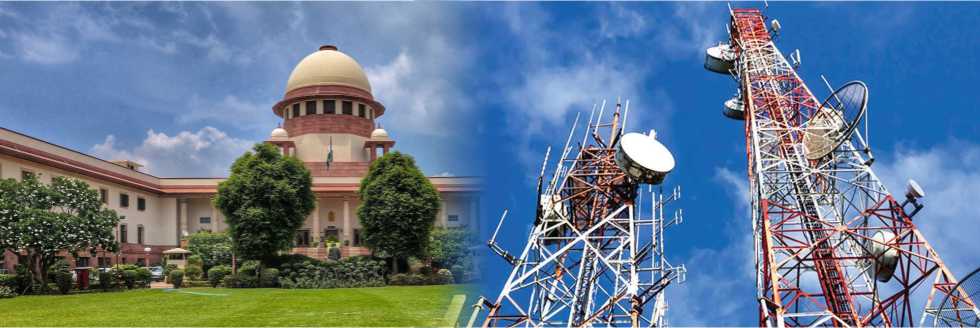On 10th August 2020, the Supreme Court has asked the Solicitor general, Tushar Mehta (representing the Department of Telecommunications (DoT)) of whether spectrum can be sold by telecom companies that are undergoing proceedings under the Insolvency and Bankruptcy Code (IBC)?
The bench comprising of Justice Arun Mishra, S Abdul Nazeer, and MR Shah raised the issue while hearing a case related to adjusted gross revenue (AGR) dues by the telecommunication companies. The attention of the bench was drawn to the issue of bona fides of the telcos that filed for proceedings of IBC.
During the proceedings, the court reiterated that there would be no consideration as to objections relating to the assessment of the AGR dues or attempts to recalculation or revaluation of the same. The only aspect before the court to be entertained was to fix a time period within which these dues can be cleared by the telecom companies.
Subsequently, the Court said that it would ferret into the issue of initiation of insolvency proceedings against various telecom companies with regard to their outstanding liabilities.
To these questions, SG Mehta said that the center is in the process of filing an affidavit. He drew the kind attention of the Court to the fact that all the IBC cases as regards various telecom companies were at different stages. Further, he submitted a summary of amounts recoverable from companies like Reliance Communications and Aircel and pointed out that as opposed to submissions made by Aircel before the National Company Law Tribunal (NCLT), a spectrum cannot be included as the company’s assets, since, it is national property and cannot be sold off by the company.
Coming to the point of Reliance Communications, SG Tushar Mehta reiterated the Court that the objections as to spectrum sale are still under consideration before the Supreme Court. In response to this, the Bench asked why there was a delay on the part of the government to file an appeal raising the point that the spectrum could not be sold. Justice M R Shah, expressed his concern, saying that “What if the spectrum is sold in the meanwhile?”
Subsequently, Senior Counsel Shyam Divan, representing Reliance Communications (R Com) while informing the Court of the Corporate Insolvency Resolution Process (CIRP) process with respect to the company has also said that the resolution plan is pending before the NCLT till date.
The Court then questioned as to – how the proceedings under Section 7 of the IBC against Reliance Communications were revived by the NCLAT even after the Supreme Court’s order of August 2019 that directed for a settlement payment between Reliance and Ericsson.
The NCLAT, which had injuncted the insolvency proceedings against R Com in 2018, had lifted this stay and allowed for the proceedings to continue before the NCLT after the Supreme Court passed the order directing R Com to pay Rs. 550 Crores towards a settlement with Ericsson.
Senior counsel, Divan, informed the Court that the Committee of Creditors (CoC) has completely approved the resolution plan. The Court asked Divan to file a hard copy on the submissions. The case was adjourned for further arguments on behalf of Reliance communication, listed for August 14.
As far as the matter of Aircel is concerned, the Court was told by Senior Advocate Ravi Kadam that the company had paid money upfront to buy spectrum. He said that the same was approved by the NCLT as it was a transferable asset.
Before, adjourning the matter, the apex court reiterated to SG Mehta to come prepared with answers to questions relating to the sale of spectrum.
On 20th July 2020, the Court had reserved its order on the time period to be allowed to telecommunication companies to settle their AGR dues through swayed payment.
On that date, the Bench was informed by the DoT that it would stick to allowing a period of 20 years for staggered payment of AGR dues by telecom companies. This was in a slight difference from the 15-year window proposed by Vodafone-Idea as well as Bharti Airtel. Tata Telecom had argued that a 7-10-year window would be required.
After the Apex Court, in October 2019, delivered its judgment on the interpretation of “Adjusted Gross Revenue”, it granted the telecom companies a period of 90 days to clear the dues that would follow. Keeping in view the collapsing financial and economic health of the country as well as the telecom industry, the DoT, in March sought a modification of the Court’s order and proposed a time-frame of twenty years for swayed payment of these dues, in line with a formula evolved by the Union Cabinet.
While presiding over this plea in March, the Court had pulled up the DoT for allowing telecom companies to self-assess the dues payable by them. The Court highlighted its discontent with the telecom companies very clear and stated that the continued attempts made by these companies seeking re-assessment of the October 2019 order amounted to a fraud on the Court.
Eventually, the Court asked the Centre to consider withdrawing its demand of AGR dues from PSUs mentioning that the October 2019 ruling did not bring Public Sector Undertakings (PSUs) under its purview. This demand was subsequently withdrawn by the DoT and communicated to the Supreme Court.
This news has been written and submitted by Ms. Mansi Batra during her course of internship at B&B Associates LLP. Ms. Mansi is a third-year law student at the Fairfield Institute of Management and Technology, Kapashera, New Delhi.






